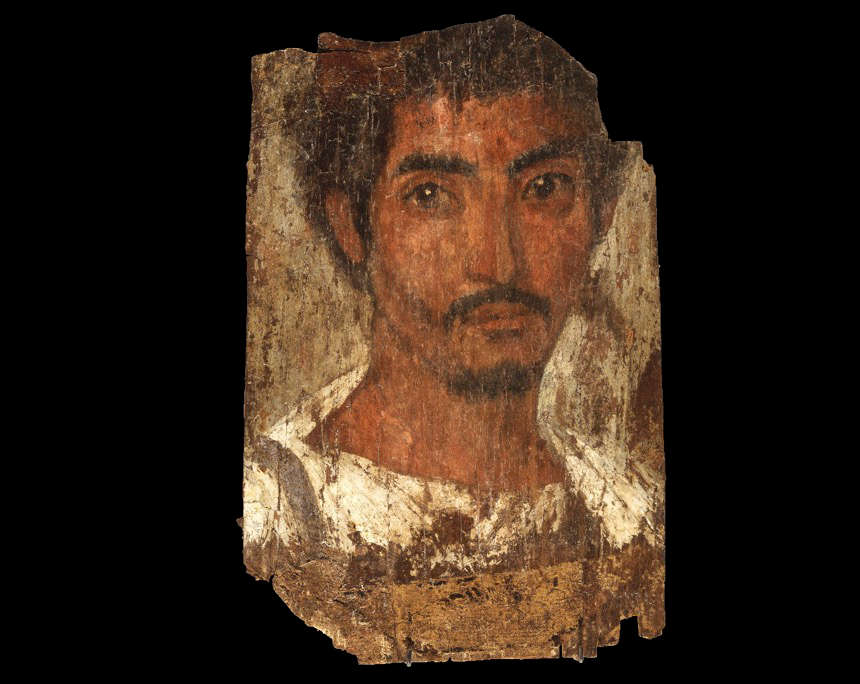Ancient Art at Gorny & Mosch
Gorny & Mosch
Auction 300
Ancient Art
12-13 December 2023
D-Munich
For Gorny & Mosch’s Auction 300 in Munich, a splendid print catalogue has been published. From 2 p.m. on 12 December 2023, more than 580 lots will be auctioned off. Truly a highlight of the auction is a mummy portrait (lot 329) from the Nikola Koutoulakis Collection, exhibited and published at the Royal Museums of Fine Arts in Brussels. Also on offer is the important Dr. Wiegand Collection comprising more than 100 ancient glasses, some very remarkable pieces of which were purchased from Axel Weber in Cologne in the 1980s (proof of purchase included). Another particularly noteworthy part of the auction is a selection of stamp and cylinder seals from the German Karl Müller Collection as well as several Minoan seals from the collection of Dr. Ernst Grumach (1902-1967, Classical Philologist) – including a cylinder seal with “Acharnes script”, an ancient logographic system representing what is likely one of the earliest forms of writing in Europe. Furthermore, there is a remarkable selection of bronze sculptures and vases on offer.
An overview of the pieces on offer:
- Vases: 63 lots
- Terracotta: 23 lots
- Stone sculptures: 28 lots
- Bronze sculptures: 19 lots
- Instruments: 11 lots
- Lamps: 28 lots
- Mosaics and paintings: 5 lots
- Jewellery: 24 lots
- Cameos, gems, seals: 40 lots
- Glass objects: 100 lots
- North Africa: 70 lots
- Ancient Orient: 29 lots
- Pre- and Early History: 17 lots
- Byzantium: 8 lots
- Icons: 15 lots
- Islam: 3 lots
- Pre-Columbian America: 76 lots
- Asia: 25 lots
- Africa: 2 lots
- Modern period: 7 lots
- Natural history: 1 lot
Lots 1-583 will be auctioned off during the Live Auction on 12 December 2023.
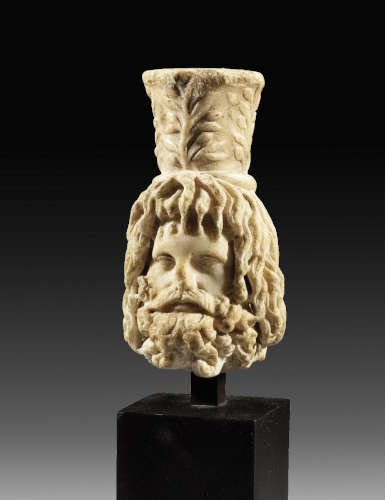
© Gorny & Mosch Giessener Münzhandlung GmbH Auction 300, 2023, lot no. 88. (image: Michael Girschick, Starnberg).
Lot No. 88
Head of Sarapis Roman Imperial Period, last quarter of the 2nd century A.D. White, fine crystalline marble. H 13cm. Head of the bearded god with luscious, flowing hair, five strands of which fall onto his forehead. On the head is a modius with olive branches on the side. Particularly striking is the skilful use of the drill to almost completely expose the front areas of the hair, creating dramatic effects of light and shadow which add a high level of plasticity to the head. Excellent sculptural work! Details concerning the origin of the cult of Sarapis remain unclear. According to one common theory, it was established by Ptolemy I in Alexandria, with the purpose of creating a deity that combined Egyptian and Greek cults. The cult image – attributed to Bryaxis, a famous sculptor active in 4th century B.C. – was originally an image of Hades from Sinope that was transported to Alexandria and re-dedicated. Lit.: LIMC VII (1994) s.v. Sarapis 666f. Regarding the type, cf. particularly catalogue No. 93a. Provenance: Ex K.A. Collection, France. With French antiquities passport! Estimate: 25,000 euros
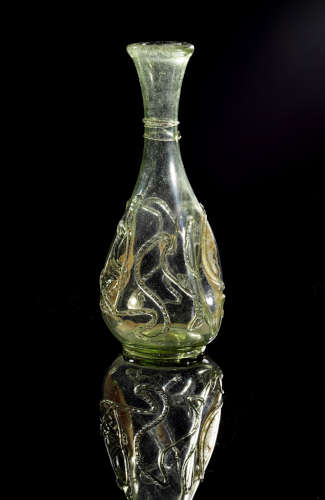
© Gorny & Mosch Giessener Münzhandlung GmbH Auction 300, 2023, lot no. 230. (image: Michael Girschick, Starnberg).
Lot No. 230
Bottle with snake-threads. Cologne, 2nd – 3rd century A.D. H 15.1cm. Greenish translucent glass. Piriform body on ring base with tall neck growing into funnel mouth with rounded rim. A thin green thread is looped three times around the neck. Body with four large indentations creating a ribbed effect. Decorated with two wavy, pressed and cross-ribbed intertwining threads. Intact! Very rare – especially in this quality! Provenance: Ex Dr. Wiegand Collection, Bavaria, purchased from Axel Weber, Cologne. With certificate from Axel Weber dated 1988 (copy)! Estimate: 8,000 euros
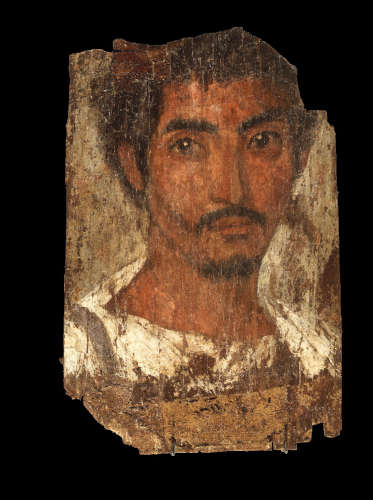
© Gorny & Mosch Giessener Münzhandlung GmbH Auction 300, 2023, lot no. 329. (image: Michael Girschick, Starnberg).
Lot No. 329
Mummy portrait. Fayum, approx. 130 – 150 A.D. 32 x 22cm. Encaustic painting on thin, slightly corrugated wood. Depicted is a middle-aged man with medium-length, dark brown hair, moustache and light stubble on the chin. He is wearing a white robe with red clavi and a coat draped over his left shoulder. The Greek upper class in Egypt occasionally adopted the burial rites of the local population. Particularly in Fayum, the custom of replacing the traditional mummy masks with realistic portraits developed during Roman times. These portraits, created either in encaustic or egg tempera, are virtually the only relics to which this technique was applied to have survived through the ages. Today, approximately 900 such portraits – greatly varying in quality – are known to exist. The more well-made pieces, including this one, are characterised by their striking realism. The artists paid particular attention to the vivid detailing of the eye area, giving the modern viewer the impression of being face to face with a person of antiquity – an effect probably unique to this genre of ancient art. Provenance: From the Nicolas Koutoulakis Collection, Geneva, purchased before the 1960s. In Belgium (Depot Musées royaux d‘Art et d‘Histoire) 2015 – 2023. Exhibited and published in: L. Delvaux – I. Therasse. Sarcophages sous les étoiles de nout (2015) p. 164f. Fig.19a-d. Including conservation report from Morocco, London, 2011. Estimate: 90,000 euros
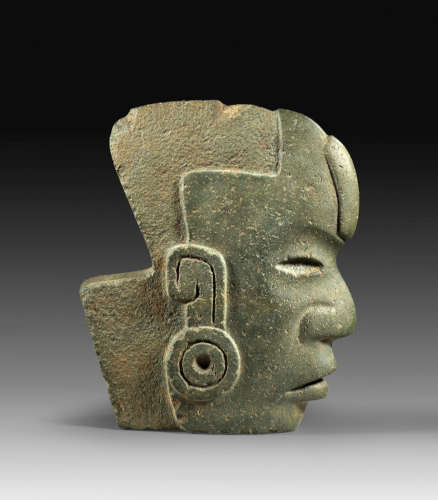
© Gorny & Mosch Giessener Münzhandlung GmbH Auction 300, 2023, lot no. 472. (image: Michael Girschick, Starnberg).
Lot No. 472
Veracruz Maya Hacha. Ca. 550 – 950 A.D. 23 x 19.5cm. Green stone, carved on both sides. Ceremonial axe in the shape of a human head with classical, stylised facial features, large earplugs and a forehead ornament. Excellent piece! Provenance: Ex U. H. Collection, Southern Germany, since 1980s; ex H. Breuninger Collection, Stuttgart, purchased in the 1970s at Heubel Antiquitäten, Cologne-Dünnwald. Estimate: 7,000 euros
E-Auction
Lots (lots 584-899) as well as literature (900-921) will be sold within the scope of an e-auction starting at 2pm on 13 December 2023.
Viewing
Viewings take place at Gorny & Mosch, Maximiliansplatz, starting immediately from
Monday to Friday, 10 a.m. – 1 p.m. and 2:30 p.m. – 6 p.m by prior appointment.
The catalogue for auction 300 can be ordered at Gorny & Mosch, Giessener Münzhandlung, Maximiliansplatz 20, 80333 Munich, Germany, phone: +49 (0)89 24 22 643-0, fax +49 (0)89 22 85 513.







